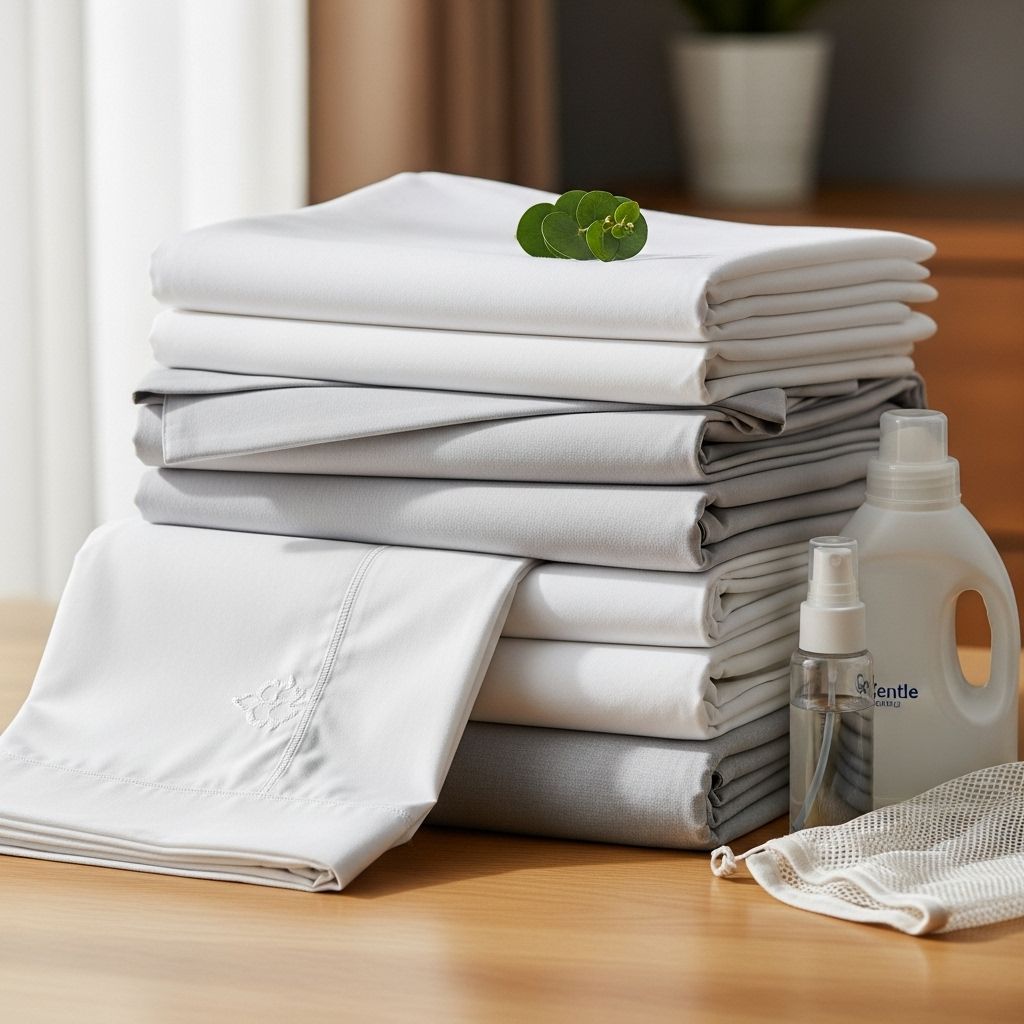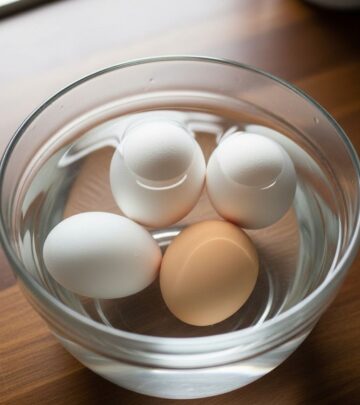How to Care for Bed Sheets: Expert Guide to Cleaning, Stain Removal, and Longevity
Quick laundering methods ensure linens remain soft, fresh, and durable over time.

How to Care for Bed Sheets
Fresh, clean bed sheets not only improve your quality of sleep but also add to the comfort and beauty of your bedroom. To preserve your investment in bedding and ensure every night’s sleep is as inviting as possible, it’s essential to know exactly how to wash, dry, store, and refresh your sheets—no matter their material.
How Often to Wash Bed Sheets
Regular laundering is critical for maintaining sheet hygiene and fabric quality. The general rule is to wash your bed sheets every one to two weeks, but personal habits and circumstances may require more frequent cleaning. For instance, if you:
- Sweat heavily at night
- Allow pets on your bed
- Sleep unclothed
- Have allergies or sensitive skin
then washing sheets once a week is highly recommended. For guest beds or infrequently used bedding, washing after each use or every three to four weeks is sufficient.
Preparing Your Sheets for Washing
Before tossing your sheets in the washer, a little preparation ensures the best results and helps extend their life.
- Always read the care label: Different fabrics (cotton, linen, bamboo, silk, synthetics) require different treatment to avoid damage.
- Pre-treat stains: Identify and address stains before full laundering. Spot-treat using a mild cleaning solution appropriate for the specific type of stain.
- Close zippers or buttons: This prevents snagging and uneven wear during washing.
- Separate colors: Wash light and dark-colored sheets separately to prevent color bleeding.
How to Wash Sheets Properly
Proper washing techniques vary depending on fabric type, but most methods preserve both cleanliness and softness.
General Washing Instructions
- Use the hottest water temperature the fabric allows: Cotton can generally be washed in hot water, which helps kill dust mites. More delicate materials like silk or bamboo call for cold water and gentle handling.
- Choose a gentle, mild detergent: Harsh chemicals or bleach can break down fibers and cause fading. Avoid fabric softeners with sheets, as they may leave residue that decreases softness and absorbency.
- Wash sheets separately: To ensure a thorough clean and prevent tangling with heavier fabrics (like towels).
- Select a gentle or normal cycle: This protects fibers from unnecessary wear and tear.
- Avoid overloading the machine: Give sheets plenty of space to move freely for an even wash and rinse.
- Consider an extra rinse: Especially if you have sensitive skin, an extra rinse cycle removes any remaining detergent.
Fabric-Specific Instructions
| Fabric Type | Water Temperature | Cycle | Drying |
|---|---|---|---|
| Cotton | Warm to hot | Normal or gentle | Tumble dry low or line dry |
| Linen | Cold or warm | Gentle | Tumble dry low or air dry |
| Bamboo | Cold | Gentle | Low heat or line dry |
| Silk | Cold | Hand wash or gentle | Air dry only |
| Polyester/Microfiber | Warm | Normal | Tumble dry low |
How to Remove Stains from Sheets
Stains from sweat, body oils, food, or cosmetics are inevitable. Immediate action will boost your chances of removal without damaging the fabric:
- Act quickly: Remove the sheet and address the stained area immediately.
- Blot, don’t rub: Use a clean, damp cloth to gently dab the stain. Rubbing can spread or drive it deeper into fibers.
- Use the right solution:
- Protein stains (blood, sweat): Use cold water with a little mild detergent or enzyme-based product.
- Oil-based stains (lotions, makeup): Apply a tiny amount of dish soap and rinse with cold water.
- General stains: Solutions like white vinegar, baking soda paste, or hydrogen peroxide (for white sheets only) are often effective. Always test in an inconspicuous seam first.
- Machine wash as usual: After pre-treating, launder using recommended methods above.
- Air dry: Avoid the dryer until you are sure stains are gone, as heat can set stubborn marks.
How to Hand Wash Sheets
Some delicate materials like silk or fine linen require extra care. Handwashing prevents fiber breakage and shrinkage. Follow these steps for best results:
- Read the label: Confirm hand washing is recommended.
- Use cold water: Hot water can damage delicate fibers.
- Dissolve a small amount of gentle detergent: Swirl in a clean sink or bathtub to blend completely.
- Soak the sheets for 15–30 minutes: Gently swirl or knead by hand—avoid wringing, twisting, or scrubbing.
- Rinse thoroughly in cold water: Repeat rinsing until water runs clear.
- Press out excess water: Press between clean towels—never wring, as this can stretch or misshape the fabric.
- Air dry flat or on a clothesline away from direct sunlight: Sun may fade or weaken certain fibers.
How to Dry Bed Sheets
Proper drying is just as important as washing for maintaining sheet quality, feel, and fit.
- Shake out sheets before drying: Helps minimize wrinkles and allows for even drying.
- Set dryer to low or medium heat: High heat can shrink, overdry, or degrade fibers, especially with bamboo, linen, or silk.
- Remove sheets promptly: Taking sheets out just before they are completely dry minimizes wrinkles and makes folding easier.
- Air dry when possible: Hang sheets outdoors or on an indoor rack. Sunlight can naturally disinfect and refresh, but avoid prolonged exposure for dyed fabrics.
- Avoid dryer sheets and fabric softeners: These can coat fibers and reduce breathability; if desired, use dryer balls to soften and reduce static.
Should You Wash New Sheets Before Use?
Yes, always wash new bed sheets before first use. New sheets may contain residues from manufacturing (such as finishing chemicals or excess dye) which can cause skin irritation or affect sheet performance. Pre-washing:
- Removes dust and residues
- Softens the fabric
- Prevents dye transfer or color bleeding when you next launder your bedding
A popular pre-wash method is to use a cycle with a cup of baking soda and, during the rinse, a half-cup of white vinegar. This combination cleanses and softens the sheets without harsh chemicals.
Best Practices for Maintaining Bed Sheets
- Rotate between multiple sheet sets: This reduces wear and extends the usable life of each set.
- Store sheets properly: Keep in a cool, dry closet away from direct sunlight. Place in a fabric bag or pillowcase to protect from dust.
- Never eat, drink, or use heavy lotions in bed: This minimizes staining and the need for extra washes.
- Keep pets off the bed where possible: Pet fur and dander contribute to soil and allergens.
- Avoid ironing if possible: Most sheets smooth out after a gentle tumble or air dry; ironing can weaken fibers over time.
Troubleshooting Common Sheet Care Problems
- Yellowing or dingy whites: Soak in an oxygen-based bleach solution (never chlorine bleach) before washing. For persistent yellowing, repeat soaks over several cycles.
- Pilling: Use a lint shaver or fabric comb to remove. Prevent by washing sheets separately and avoiding harsh detergents or high heat drying.
- Shrinkage: Always follow temperature guidelines and avoid overdrying. Pre-shrunk sheets may fare better, but natural materials will shrink slightly after initial washes.
Sheet Care by Material
Cotton Sheets
- Durable and easy-care; tolerate warm/hot water
- Whiten with gentle oxygen bleach, not chlorine bleach
- High heat may cause shrinking; stick to medium dryer setting
Linen Sheets
- Breathe well and soften with each wash
- Wash warm or cold, but never use bleach
- Line drying best; tumble dry on low to minimize wrinkles
Bamboo Sheets
- Wash in cool water with mild, non-bleach detergent
- Never use fabric softeners
- Machine dry low or air dry to prevent shrinkage
Silk Sheets
- Hand wash or machine wash cold in a mesh bag on gentle
- Use silk-specific or mild detergent
- Never wring; roll in towel to absorb water and hang dry
Polyester and Microfiber Sheets
- Tolerate regular or warm cycles
- Avoid bleach to prevent fiber damage
- Dry quickly; remove promptly to reduce wrinkles
Frequently Asked Questions (FAQs) About Bed Sheet Care
How often should I wash my sheets if I have allergies?
Allergy sufferers should wash sheets every 3–4 days to remove dust mites and allergens. Hot water is most effective, provided the fabric can tolerate it.
Can I wash sheets with towels or other textiles?
It’s best to wash sheets separately. Towels may produce lint and require different temperature and cycle settings, which can damage delicate sheet fibers.
Is it safe to use bleach on my sheets?
Generally, avoid chlorine bleach—it can break down fibers and yellow whites over time. For a safe whitening boost, use oxygen-based bleach or a solution of baking soda and vinegar.
What’s the best way to fold and store bed sheets?
Fold fitted and flat sheets neatly; store each set inside one pillowcase for easy access and organization in your linen closet. Always store in a cool, dry, well-ventilated space.
How can I make my sheets last longer?
- Rotate between two or more sets
- Wash with gentle cycle and mild detergent
- Avoid high heat for both laundry and storage
- Keep food, beverages, and heavy lotions out of bed
Final Thoughts
Caring for your bed sheets isn’t complicated, but thoughtful attention to washing, drying, and storage ensures you enjoy fresh, inviting bedding night after night for years to come. By following best practices tailored to each fabric type and addressing stains quickly, you’ll extend your sheets’ life and maximize comfort in your sleep sanctuary.
References
- https://www.sleepfoundation.org/best-sheets/how-to-wash-sheets
- https://southshorefinelinens.com/blogs/southshoreblog/how-to-properly-care-for-bedding
- https://cozyearth.com/blogs/news/how-to-wash-bamboo-sheets
- https://www.youtube.com/watch?v=KZU5EUaVCOM
- https://www.belledorm.co.uk/blog/wash-bedding-before-first-use
- https://www.dreamcloudsleep.com/posts/how-often-should-you-wash-your-sheets
Read full bio of Sneha Tete










